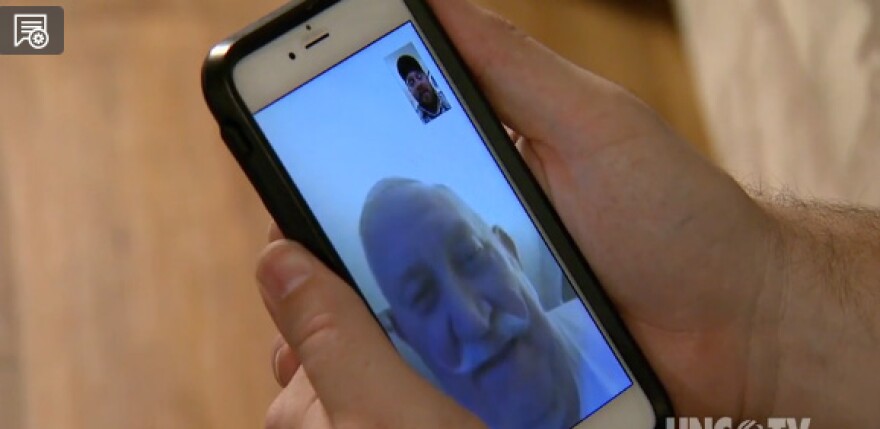Under different circumstances, Tommy Rieman could have been charged with a DUI when he got drunk and drove into a tree. But because he's a veteran he was enrolled in the state's first Veterans Treatment Court, a program designed to give support rather than punishment.
This chapter of Rieman's story starts in Iraq, 2003.
"Before the war started we were in Iraq, calling in air strikes you know?" he remembers. "I was 21, 22 years old. You're on top of the world."
One day, Rieman's team of eight was in a convoy and they were ambushed, hit with rocket-propelled grenades, three IEDs and a hail of small arms gunfire. His vehicle did not have doors so those inside were vulnerable, and the fighting was intense.
"We were being suppressed, by enemy fire, so I used my body as a shield to protect the gunner," says Rieman. "I was shot in the arm and the chest and I took a eleven pieces of shrapnel in my body."
Even though he was severely injured Tommy Rieman kept fighting that day. He led the convoy to another location, where they were ambushed a second time.
"We engaged them until they were silenced and all eight of us made it home," he says.
Tommy Rieman was nominated to receive a Silver Star, one of the highest military distinctions of valor. He also received a Purple Heart.

President Bush recognized Tommy Rieman at the State of the Union Address in 2007:
For his exceptional courage, Sergeant Rieman was awarded the Silver Star. And like so many other Americans who have volunteered to defend us, he has earned the respect and gratitude of our whole country. In such courage and compassion, ladies and gentlemen, we see the spirit and character of America — and these qualities are not in short supply.
It's around that time that Rieman was chosen to be a part of the America's Army Real Heroes Program - an effort from the Army to showcase heroic soldiers. His face was featured on the cover of an XBOX 360 game, his image modeled onto a toy action figure.

But inside Rieman was troubled.
In 2010, Rieman re-deployed to Iraq but one night he spent hours with his gun in his mouth, switching the safety on and off, contemplating pulling the trigger. His roommate took him to the combat stress center. He got some help in the short term, and completed his tour, but when he got home, things didn't improve.
He was dealing with post traumatic stress when his sister died. He had buddies who were killed and injured overseas, and others who took their lives at home. He was wracked with guilt over his failed marriage, was on a lot of medication and was drinking too much. When his girlfriend left him, he snapped.
"And I wrote a goodbye letter to my kids, letting them know that I loved them more than anything and leaving was not what I wanted to do, but I felt like it was all I could do to make their lives better because they would be better off without me," he remembers. He got into his truck, got up to speed, closed his eyes, and drove into a tree.
"And I opened up my eyes and I'm looking around. I was just pissed off. I couldn't believe I was still here, and then I realized, holy cow, I just tried to kill myself."
Veterans Treatment Court.
Rieman could have been charged with a DUI and gone to jail. Instead, he acknowledged his guilt and, with the blessing of the District Attorney, he was assigned to a first-of-its-kind program in the state, a Veterans Treatment Court. There's substance abuse and mental health treatment assistance - as well as regular hearings with a judge.

One of the most powerful parts of Veterans Court is being paired with a mentor. Tommy's is George Williams. George answers a Facetime call with a jovial, upbeat voice and says "What's happening, man?"
Williams is a Vietnam vet, a Green Beret who is highly decorated. He's got a huge handlebar mustache and his smile fills the screen. The two have connected regularly as a part of the program over the past year. Just seeing his mentor lifts Rieman's spirits.
"When you see that face, I kid you not, can you not smile at that face?" Rieman asks. "He should be the action figure, you know what I mean? This guy, he has the warmest, kindest heart, and the coolest mustache and [he's] just somebody that you respect instantly," says Rieman. "He's somebody I'd go to war with. He's somebody I can think of and not want to let down."
In mid-November, Tommy Rieman fulfilled the Veterans Treatment Court program requirements. The final ceremony was held in a courtroom. Were this a criminal court, there might be a stern talking-to from a judge. Instead, Rieman was publicly recognized for his completion of the program, and for his service.
During the ceremony, the judge came down from the bench and stood directly in front of Rieman and then saluted him.
During the ceremony, the judge came down from the bench and stood directly in front of Rieman and then saluted him. Rieman said it's that type of respect that has helped him get his life back together.
After his suicide attempt, Tommy lost his job and his home. Now, a year later, he works for Charlotte Bridge Home, an organization that helps veterans re-gain their footing. Rieman says that by helping veterans, he is also helping himself.
"I love being there for them. This is the most rewarding thing of anything I've done, this is probably the most proudest time of my life."
Tommy Rieman is now trying to expand the Veteran's Court model in North Carolina. He'd like to establish one in Charlotte, where he lives and works.
>>Find Veterans Court locations nationwide.
Tommy Rieman tells his story in his own words:










